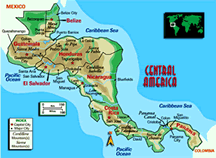
Experts on the Central American Free Trade Agreement (CAFTA) – including two policymakers who played key roles in negotiating agreements for their respective countries – will discuss the implications of this new trade zone in a roundtable discussion at 4:30p.m. March 28 (Wednesday) in the Hesburgh Center auditorium at the University of Notre Dame.
Panelists will include Norman Garcia Paz, Honduran ambassador to the United States and former Honduran minister of trade and industry, and Alberto Trejos, Costa Rica’s former minister of foreign trade and a professor at Instituto Centroamericano de Administracin de Empresas.
Joining them will be Notre Dame’s Jeffrey Bergstrand, a professor of finance who specializes in free trade agreements, and Jaime Ros, a professor of economics who researches development and trade issues. Scott Mainwaring, director of the Kellogg Institute for International Studies and the Eugene Conley Professor of Political Science, will chair the panel.
By the time it is fully implemented, the new CAFTA trade zone (officially known as DR-CAFTA) will create the second largest Latin American export market for U.S. producers, behind only Mexico, amounting to $15 billion of goods annually. Two-way trade amounts are estimated to exceed $32 billion. In 2006, all but one country in the Central American Free Trade Agreement either approved or implemented the treaty, and the remaining nation — Costa Rica — appears likely to approve it this year.
Proponents argue that DR-CAFTA will help create stronger institutions, spur economic growth, and improve enforcement of labor and environmental legislation, while affording consumers better quality and lower cost products. Critics cite the prospect of higher prices for pharmaceuticals and the potential for increasing poverty among Central American farmers.
Sponsored by the Kellogg Institute, the presentation is free and open to the public.
Originally published by at newsinfo.nd.edu on March 21, 2007.